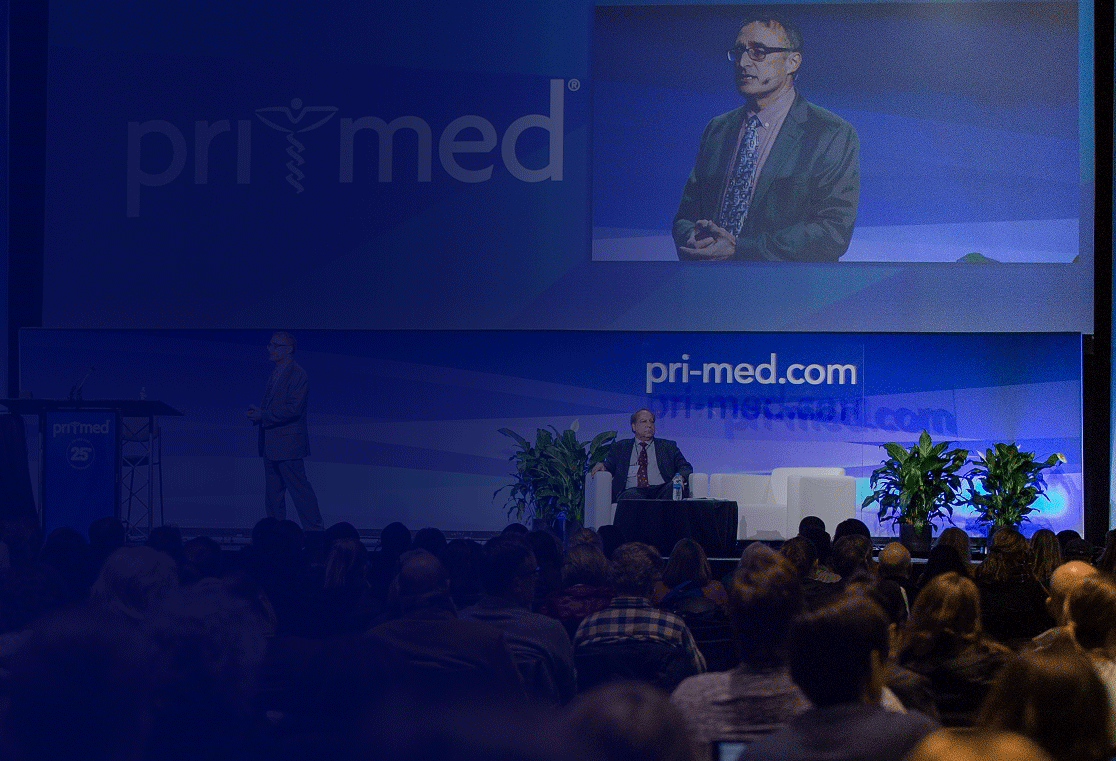Author: Frank J. Domino, MD
More than three thousand clinicians gathered at the Boston Convention and Exhibition Center for the 25th anniversary of Pri-Med East with a common goal: to become a better clinician. With that goal in mind, I worked with Pri-Med as a course chair for this conference to curate an agenda of outstanding speakers and timely topics for primary care. Each session offered important clinical “pearls” that clearly improve how we care for our patients. You can read some of the most valuable pearls I’ve strung together from each talk below.
Hypertension Cases: Controversies, Challenges, and Treatment Goals
Karol Watson, MD | Session Recording
- Common causes of hypertension include drugs/alcohol, NSAIDs, and sleep apnea
- The increase in creatinine from ACE inhibitors will usually peak within a week; if it is greater than 30%, stop the drug
- Adding an ACE inhibitor or ARB to a calcium channel blocker can decrease edema
- Hyperaldosteronism can cause resistant hypertension; use spironolactone for patients with resistant hypertension
Watch Out! Falling Older Adults
Lee Lindquist, MD | Session Recording
- Consider the following when performing a gait assessment:
- Motor: Ability to rise from chair without using arms
- Balance: Tandem (heel to toe) walk, one-leg balance
- Gait: Walking straight and making turns
- Fall prevention: Refer to physical therapy for strength/balance training, perform a home evaluation, and address polypharmacy
- Evaluate for substance use/alcohol use and vision changes
Medical Literature Updates: Cardiology Highlights from 2019
Ty Gluckman, MD | Session Recording
- Most patients – whether naive to or on lipid-lowering therapy – do not require a fasting lipid panel
- Statins are the mainstay of lipid-lowering therapy in all four at-risk groups
- Calculating 10-year ASCVD risk is an important step in primary prevention
- Calcium scoring can refine patient risk in those predicted to have a 10-year risk of ≥7.5% to <20%
- Statin-associated muscle symptoms are infrequent but can be addressed by changing to newer statins and/or taking the longer-acting statins every other day
Addiction Medicine Express
Petros Levounis, MD | Session Recording
This lecture presented valuable tips for treating addiction to the following substances:
- Alcohol: Alcoholics Anonymous or individual cognitive behavioral therapy and medications (benzodiazepines for withdrawal), and medication-assisted therapy with acamprosate (Campral) or naltrexone (ReVia, Vivitrol)
- Opioids: Buprenorphine
- Stimulants: Cognitive behavior therapy
- Cannabis: Motivational interviewing
- Tobacco: Varenicline
- Benzodiazepines: Switch and taper
Cases in Geriatrics: Navigating Polypharmacy in the Elderly
Lee A. Lindquist, MD, MPH, MBA | Session Recording
- Do not give sleeping medications to the elderly; instead, address causes of interrupted sleep (e.g., diuretics, alcohol, daytime naps)
- Aspirin is not indicated for primary prevention after age 70 years
- Statins are not indicated for primary prevention after 75 years
One Size Fits All: The Benefits of Exercise
Neil Skolnik, MD | Session Recording
- 150 minutes of moderate-intensity exercise per week is ideal
- Add strength and balance exercises in patients over 65
- Be concrete with patients about exercise: “Why, What, Where, When, and Who”
Approaches to Patients with Multiple Aches and Pains
Peng Thim Fan, MD, FACP | Session Recording
- Examine the whole patient when addressing aches and pains
- Identify the target tissue and joint distribution
- Recognize synovitis; the joint capsule will have a firm, spongy feel
- Interpret laboratory studies in the context of the clinical picture (i.e., order an ANA only if you suspect SLE, as false positives are high)
Challenging Diagnostic Dilemmas in Primary Care
Gerald W. Smetana, MD | Session Recording
- When evaluating a patient with potential pulmonary embolism, calculate risk using the Wells criteria
- When evaluating a patient with persistent fever and illness, consider HIV and mononucleosis
- Differential diagnoses of acute scrotal pain are epididymitis and testicular torsion (profound testicular swelling and absence of cremasteric reflex)
Medical Errors: The Most Common Mistakes and How to Prevent Them
Panagiota Caralis, MD, JD, FACP | Session Recording
- In the context of a medical error, an adverse event is an injury caused by medical management and not by complications of a disease
- In primary care, the most common adverse events are due to delay in treatment, missed/delayed diagnosis, and medication errors
Infectious Disease Highlights from 2018–2019: A Focus on Ambulatory Care
Paul E. Sax, MD | Session Recording
- TMP/SMX is preferred for abscesses (along with incision and drainage) and skin infections
- The recombinant zoster vaccine is much more effective than the live vaccine
- Use PrEP for HIV prevention, given daily; on-demand is an alternative for men only
Let’s Talk About Depression: Recognition and Management
Shirah Vollmer, MD | Session Recording
- Most of mental health care is now done by primary care clinicians
- Use medication and psychotherapy
- Current treatments fail about one-third of our patients
- Psychedelics and neuromodulation could be the next frontier in treatment
Enjoy sessions similar to the ones listed above at our medical conferences conveniently located throughout the U.S. and online at no cost. Earn CME/CE credits today with our primary care-focused education.


